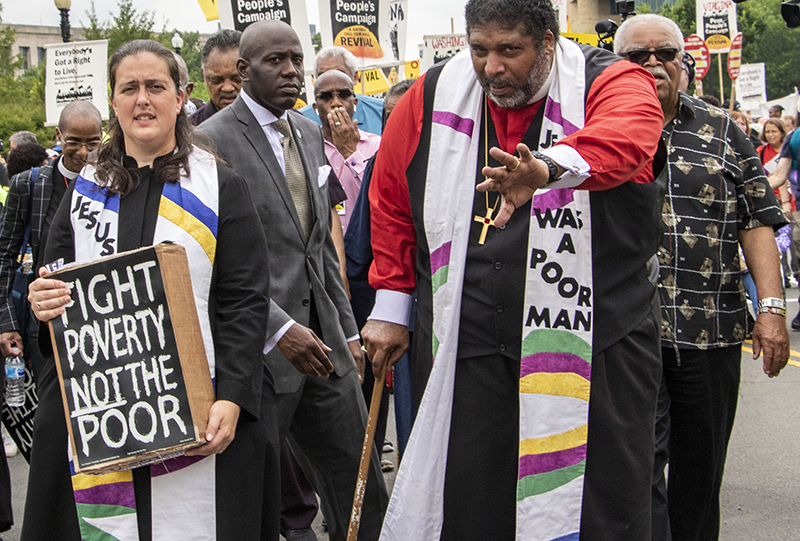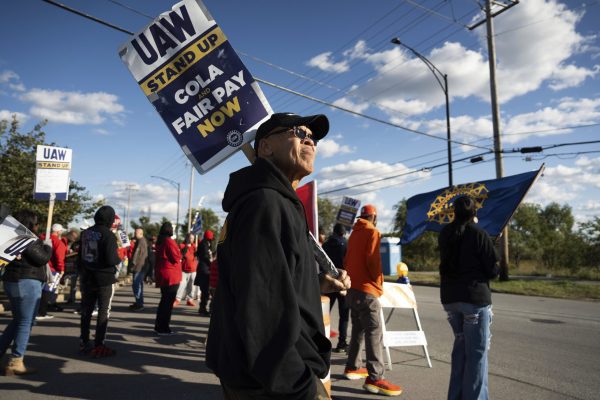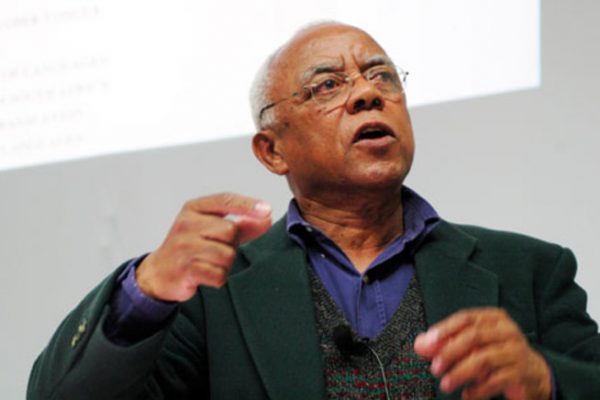The January 3 assassination of Qasem Soleimani was a major escalation in the U.S. conflict with Iran. In reality, though, the United States has been besieging Iran with lethal, if less bloody, tools of war for over a decade. In the last few years, the United States has introduced devastating sanctions targeting Iran’s oil revenues (which accounted for 80 percent of the country’s foreign earnings), and these have been intensified by the Trump administration under a campaign called “Maximum Pressure.” Tens of millions of Iranians suffer every day because their economy is under ruthless attack.
Both the Iranian sanctions and the SNAP cuts are instruments of a war economy that operates not to keep the majority of us safe and healthy, but to enrich the already wealthy and consolidate their power.
This strategy of economic warfare is mirrored by sanctions that the United States has imposed over the past decades in Iraq, Venezuela, and Cuba (among other places), often in tandem with more direct military force. Many of us who were alive during the first Gulf War will never forget the 60 Minutes interview between Madeline Albright and Lesley Stahl about UN sanctions against Iraq. Stahl asked Albright: “We have heard that half a million children have died. I mean, that is more children than died in Hiroshima. . . . Is the price worth it?” Albright stumbled through her answer: “I think that is a very hard choice, but the price—we think the price is worth it.”
The Geneva Conventions define collective punishment as a war crime, and we should not allow ourselves to be lulled by the sanitized language of “economic sanctions.” This masks the brutal reality of the forcible separation of millions of people from the food, water, shelter, and medical care they need to live. To impose murderous sanctions on these noncombatants, including children, in order for elites to attain their political and economic goals is a moral abomination.
At the same time, it is important to consider how these international sanctions represent a continuation of our domestic economic policies. In December, just weeks before Soleimani’s assassination, the Trump administration announced cuts to the Supplemental Nutrition Assistance Program (SNAP) that will cut federally funded food stamps to 700,000 poor households; as many as 3.1 million people may experience reduced benefits under proposed measures and means tests, including work requirements.
These changes are being sold as cost-saving measures and as tools of moral instruction, aimed at catapulting welfare recipients back into personal responsibility. But the life-threatening consequences for millions of people underscore that these cuts are in fact part of another, connected campaign of maximum pressure: America’s long war against its poor. Both the Iranian sanctions and the SNAP cuts are instruments of a war economy that operates not to keep the majority of us safe and healthy, but to enrich the already wealthy and consolidate their power. This militarism is so deeply ingrained in our economy, political life, and social consciousness that we see it as an integral and natural element of our society, if we see it at all.
This thorough militarization of our culture is what Martin Luther King, Jr., had in mind when he spoke of the “cruel manipulation of the poor.” In his day, King was thinking of the U.S. soldiers who were fighting and dying in Vietnam “on the side of the wealthy, and the secure, while we create a hell for the poor.” This hell was both the ravaged lands of Vietnam and the thousands of poor and hollowed-out communities around our country. King understood the “brutal solidarity” of black, brown, and white Americans, disproportionately poor, fighting together against the poor in Vietnam, only to return home to a nation committed to their segregation and blind to their suffering. He had seen the promise of the War on Poverty betrayed, in part, by massive investments in the war in Vietnam, and came to recognize that the war itself was “an enemy of the poor.”
Today we suffer a similar dynamic. In a nation with 140 million poor and low-income people, our government funnels 53 cents of every federal discretionary dollar into the Pentagon and extends only 15 cents to programs for the poor. Programs that fund universal health care, education, housing, and welfare, among others, are described as impractical and too expensive, but we need only look at the federal budget and our military infrastructure to recognize this as blatant mythmaking.
In June leaders of the Poor People’s Campaign testified before the House Budget Committee. When we presented far-reaching solutions to the problems in our communities, along with concrete budgetary numbers to back them up, many committee members attacked the very notion of government anti-poverty programs. Instead, they told us that poor people should find relief through churches or by joining the military.
Although there is not a military draft, there is, in effect, a poverty draft which every year forces tens of thousands of Americans to enlist, receiving some relief from poverty in exchange for killing other poor people around the world.
Indeed, the U.S. military has long functioned as our country’s largest de facto anti-poverty program. The idea of it as a pathway to the middle class is baked into our national narrative and remains a popular bipartisan talking point. This serves to justify both cutting anti-poverty programs and building up the military. But it is not especially true that the military is a route to the middle class: army privates in combat make under $30,000 annually, often well below Massachusetts’s minimum wage. Meanwhile, in 2016 the CEOs of the top five military contractors cumulatively earned $96 million. While just a few men make money off of war, many soldiers and veterans are so poor that they rely on food stamps and are homeless. Nonetheless, at a time when wages continue to stagnate, and public services and social safety nets are privatized and eviscerated, many poor young people see few other options. As such, although there is not a military draft, there is, in effect, a poverty draft which every year forces tens of thousands of Americans to enlist, receiving some relief from poverty in exchange for killing other poor people around the world.
When King spoke against the Vietnam War, most famously in his 1967 “Beyond Vietnam” speech, he was not just concerned with the policy and budget priorities of the nation and their consequences for the poor. He was also determined to “save the soul of America.” It is not just that our military spending diverts funds from programs that could uplift entire generations, but that war, in the most essential sense, devalues and obliterates human life. The militarization of U.S. society is often justified by a rhetoric of security, but the overwhelming evidence of history is that war is motivated by the drive for economic gain, and in the process the nation becomes soul-sick. Our basic moral and religious values, as well as our constitutional obligations, are distorted by it.
In “Beyond Vietnam,” King directly connected capitalism’s profit motive with warmongering: “If you treat human beings as a means to an end, you thingify those human beings. And if you will thingify persons, you will exploit them economically. And if you will exploit persons economically, you will abuse your military power to protect your economic investments.” In order to counter this bitter cycle of thingification and economic exploitation, we must directly confront the cruel manipulation of the poor. This means both challenging war and building the power of poor people to determine their own destinies.
It is not just that our military spending diverts funds from programs that could uplift entire generations, but that war, in the most essential sense, devalues and obliterates human life.
In the days after the assassination of Soleimani, it was encouraging to see anti-war demonstrations across the nation that connected Trump’s action in Iran with the suffering of the poor in the United States. I joined a march through New York’s Times Square with my ten-year-old daughter and her eleven-year-old best friend who questioned why politicians thought that killing people in the United States or Iran would bring peace. I got reports of grassroots activists in Maine and Massachusetts, California and the Carolinas turning out in numbers to decry war and the war on the poor, at home and internationally. This was a hopeful solidarity that understood that our best chance for real and lasting peace is rooted in more than just an anti-war movement, but in a broad movement to end poverty, led by the poor in this country in relationship with the poor of the world.
In the time ahead, we will need to fill the streets in new and unsettling ways, which is why the Poor People’s Campaign, which I cochair, is helping to organize the Mass Poor People’s Assembly and Moral March on Washington on June 20, 2020. This will be a historic convening right between the primaries and the party conventions, not of spontaneous protest, but of organized poor people with a transformative agenda. Out of this and every mobilization, we will need to forge a commitment to building up the independent leadership and power of the poor in a movement that sees through and beyond the cruel manipulation of sanctions and food stamp cuts.
Nothing less will save the soul of America.








